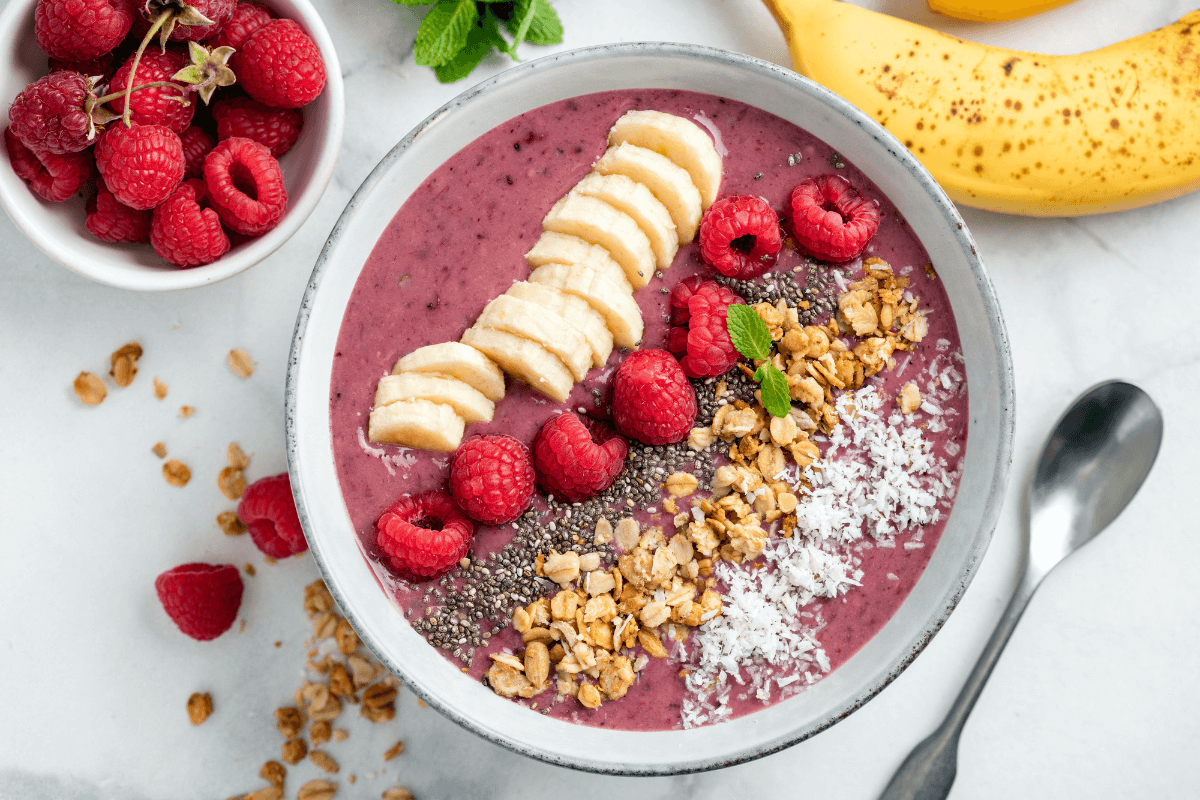
Building a foundation for a sustainable diet goes a long way toward enhancing overall well-being. This means more than just counting calories or tracking macros. It's about mindful eating, building a positive relationship with food, and recognizing your own internal cues.
This article will explore the signs indicating you're listening to your body and provide tips for creating a more sustainable diet.
What Does It Mean to Have a Sustainable Diet?
At its core, a sustainable diet indicates you’re giving your body the nutrients it needs, and your body feels good as a result. Part of this means having the right energy balance–or the right balance of macronutrients.
Food is the energy your body requires to function optimally. Eating the right foods in the right balance ensures your body is fueled and ready for anything. When your energy balance is off, you may feel those disruptions physically, mentally, or emotionally.
Advertisement
What Happens When I Don’t Fuel My Body Appropriately?
Hormone Imbalances
Your body relies on a delicate balance of hormones to function properly–all fueled by the nutrients you absorb from food. An imbalanced diet can disrupt this equilibrium, which may cause problems like trouble sleeping, weight gain or loss, fatigue, and mood swings.
Appetite Disruptions
Ever have a day where you day where you don’t feel like eating? Or a day where you can’t get enough food? While this can also be a result of physical activity or a woman’s menstrual cycle, extreme hunger or a lack of appetite on a regular basis may indicate you’re not eating the right foods. (And if you’re like most people, being hangry on the reg definitely won’t help your goal to be more zen.)
Inflammation and Chronic Pain
A lack of nutrients in your diet and eating too little or too much can contribute to inflammation. In turn, inflammation in the body shows up as chronic pain and other health and metabolic conditions, like insulin resistance.
Advertisement
9 Signs That Your Diet Is Sustainable Long-Term
So, how do you know if your diet is good for you? Think about these signs as you go through your normal day-to-day.
1. You Have Good Appetite Awareness
You can recognize when you’re hungry and decide how hungry you really are. You can also easily determine when you’re full or have had enough to eat. Along with understanding your own internal cues, you have established a regular eating routine with satiating meals. It’s no problem to stick to your routine.
2. You Don’t Have Regular Cravings
Salty and sweet cravings can make it difficult to stick with planned meals. And reaching for snacks between meals can wreak havoc on your goals, for sure. When you’re eating enough nutrients and in the right balance, you’ll likely find these cravings don’t happen as often. You probably won’t even need to snack as much because you’ll feel satiated for about three to five hours or until your next meal.
3. You Can Manage Your Weight
Daily weight fluctuations are normal. When your diet is sustainable, you can keep within the same average weight range week after week without much effort. You understand what foods make you feel good, and while you may track your meals or macros, you don’t necessarily need to. You can go a few days without tracking and easily stay within your target weight range.
4. You Have Sustainable Energy
A sustainable diet means good, sustainable energy. If you experience jittery highs and crashing lows, it usually means your blood sugar levels are not regulated well. Fueling properly makes you feel restored after eating and have lasting energy throughout the day. While that afternoon cup of coffee may be a habit, you could just as easily pass on it. (And no need for that post-meal nap!)
Advertisement
5. You’re Focused and Productive
We’re all too familiar with the term brain fog these days. A well-balanced and nutrient-rich diet gives you essential vitamins and minerals that are important for brain health. Feeling alert and efficiently working through your daily routine and tasks are good signs of a well-balanced diet. Bye-bye, brain fog.
6. You Sleep Well
Restless sleep and waking in the middle of the night without being able to fall back asleep can be another sign of an imbalanced diet. Eating heavy meals late in the day may mean your body is still digesting food while you attempt to rest, making it hard to fall asleep. Not eating enough during the day can cause a blood sugar drop at night, prompting a burst of cortisol to balance it out, which means you wake up and stay up.
Although external factors like stress, schedule changes, and travel can impact your rest now and then, eating the right balance of foods for you in the right amounts during waking hours can be a key factor in promoting regular quality sleep.
7. You Recover Well
Occasional soreness isn’t such a bad thing, but constant aching is an energy drainer and can impact your efforts in the gym. Good rest also means your body can efficiently recover from your daily CrossFit workout, a lifting session, or your long-run day. Recovery time is essential for detoxification and keeping your body running smoothly. The right meal plan makes this a breeze.
8. You Can Face Stress Head-On
The gut has been dubbed the “second brain” for good reason!
Advertisement
A sustainable diet with good nutrition promotes hormone regulation and supports serotonin production—the “feel-good” hormone that helps boost mood. This all makes it a little easier for you to handle stress. While stress management techniques are still important, a good diet makes it easier to handle stress appropriately, stay level-headed, and reduce mood swings.
9. You Find it Easy to Make Food Choices That Feel Good
A sustainable diet goes hand in hand with a good relationship with food. When it works for you, it is easy. When it doesn’t work, there’s trouble in paradise. Making choices in the moment that you know will make you feel good in the long run is a sign that you’re on the right path. Enjoying a dessert or taking advantage of an occasional treat without feeling guilty or obsessing over numbers means your mindset is in a good place.
How to Create a More Sustainable Diet
If you’re struggling to find the right foods or meals that work for you, it’s OK! Or if you were in a good place, but something went off course, try some of these tips to help tweak your plan.
Check Your Hydration
We sometimes mistake thirst for hunger. Return to your liquid intake goals and ensure you get enough water throughout the day. Hydration is also super important for energy and productivity–for many people, this could be the straightforward fix they need that makes a world of difference!
Advertisement
Keep a Food and Feelings Journal
Part of finding a sustainable diet means understanding your body’s needs. Documenting what you eat and how it makes you feel can provide valuable insights into what’s working and what’s not working. Notice that a bag of potato chips in the afternoon makes you crave something sweet after? Try swapping it out for an apple with nut butter and take note of what differences you may experience.
Adjust Your Macros for Satiety
As you age, as your body or goals change, or as your lifestyle and activity ramp up or down, your energy needs will be different. It may be necessary to adjust your macronutrient ratio from time to time. This ensures you’re getting the right balance to meet your needs in any given situation. Play around with increasing carbs and decreasing fat to get more fiber. Or maybe you need more fat instead of carbs to feel more satiated. Perhaps you just need an extra 10-15 grams of protein. Find the balance that works for now.
Enjoy a Variety of Foods
Variety is the spice of life! Well, that’s what they say anyway.
If you feel bored or out of tune, try incorporating new foods into your plan. Experiment with new recipes, flavors, or textures. Allow yourself a treat or two. Sometimes, just trying something new and different can reinvigorate your senses and give you the desired satisfaction.
Advertisement
Final Thoughts on Creating a Sustainable Diet
A sustainable diet is not a one-size-fits-all approach. It's about understanding your body, making informed choices, and finding the balance that works for you. By recognizing the signs of a well-balanced diet and making gradual adjustments, you can have a long-lasting, satisfying relationship with food.
If you need help nailing down what works best for you (or, if you need permission from a pro to enjoy a treat now and then!), we have your back! Our coaches can help you lose weight, sure, but we also specialize in habit change and provide you with the tools to nail down a nutrition plan that feels easy and right for your long-term health goals.
Amy Cimo
Amy is a Nutritional Therapy Practitioner and Certified Personal Trainer based in Baton Rouge, Louisiana. She is enthusiastic about helping others find a balance between nutrition, movement, and mindset to live happy and healthy. Amy has a BA in Mass Communication, a BS in Marketing, and a passion for storytelling and connecting people with relevant information and resources.
Schedule a Free Intro Call
Working Against Gravity has led the macro tracking and health space for over a decade. Our team doesn’t just understand the science of nutrition—we’ve spent years mastering the art of tailoring it to fit your life. That means no cookie-cutter plans, just real strategies that have worked for over 30,000 people.
Schedule a free call with our team to learn how working with a 1-on-1 WAG coach will help you reach your goals.



